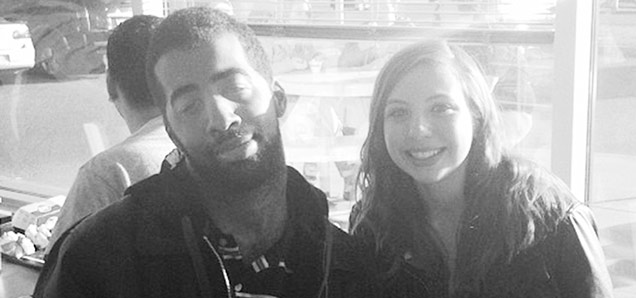Fanshawe club “budding” with opportunities
 CREDIT: BEST BUDDIES
CREDIT: BEST BUDDIESStudent President of Best Buddies London Samantha Macfarlane and Buddy Max enjoy an ice cream treat during a Dairy Queen outing.
As Roman philosopher Lucius Annaeus Seneca once said: “One of the most beautiful qualities of true friendship is to understand and to be understood.” For the Best Buddies program, this phrase couldn't be truer.
Registered as a Canadian charity in 1995, the Best Buddies program strives to make every school and community across Canada more inclusive and accepting of individuals with disabilities. An organization also affiliated with Fanshawe College and the Hutton House (a local start-up that aids disabled adults), Best Buddies provides lifelong opportunities for both clients and volunteers.
Developmental Service Worker at Fanshawe College and new Student President of the Best Buddies London Chapter Samantha Macfarlane has high hopes to continue integrating the program as a club on Fanshawe's campus.
“The Hutton House and Fanshawe College became involved with the Best Buddies Program about five years ago,” Macfarlane said. “It's a worldwide program, so it was easy to make it a legitimate club at college. Fanshawe has been a great supporter of the program because they provide funding as well as lots of student volunteers that stay for many years and keep their friendships [with the clients] strong.”
Macfarlane encourages students of all ages and studies — even those without a background in DSW or the Human Services fields — to consider participating in this worthwhile program.
“You do not need to be trained specifically to work with people who have disabilities, because [volunteers] are only there to provide a friendship,” Macfarlane said. “[Volunteers] will also always have people who are trained to help if any situation arises while peer buddies will be notified if there is a medical concern they need to know about ahead of time.”
Disabilities within the Best Buddies program can range from those with intellectual and learning disabilities, physical disabilities such as Cerebral Palsy, Down Syndrome or Autism, and/or have medical issues like epilepsy.
As for the satisfying aspect of joining the program and becoming a buddy, Macfarlane said there are many, but focused on the simplicity of establishing concrete friendships.
“The most rewarding part of my job is seeing the relationships that form throughout the year [between volunteers and clients], and the smiles on the faces of everyone who participates,” Macfarlane said. “[Volunteering] will move you ahead by putting great skills on your resume, such as communication skills, empathy for someone who may be different from you, responsibility and commitment skills, and not to mention creating a fun, long-lasting, genuine friendship.”
By joining, buddies and peer buddies will experience a range of fun and exciting monthly activities. After the first “Meet and Greet” event in October, where the official pairing up with your buddy or peer buddy is done, buddies are encouraged to stay in touch at least once a week or twice a month. In addition to that, bowling nights, star gazing atWestern University's Observatory and Dairy Queen (just to name a few) are all made available at little to no cost for participants.
Any Fanshawe student interested in joining the Best Buddies Program can visit bestbuddies.com and click on the “Get Involved” link. From there, visitors can either choose a “Peer Buddy” volunteer position, or sign up to become a “Buddy” or client of the program. Fill out the simple questionnaire and the rest will be taken care of by program officials. Willing participants can also contact Macfarlane or site coordinator Jennifer Bate at bestbuddiesfanshawe@hotmail.com













